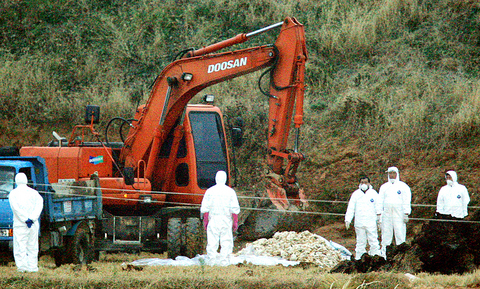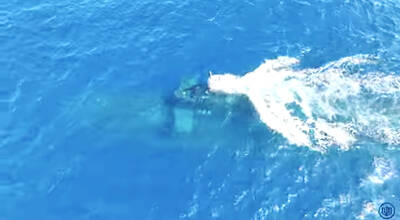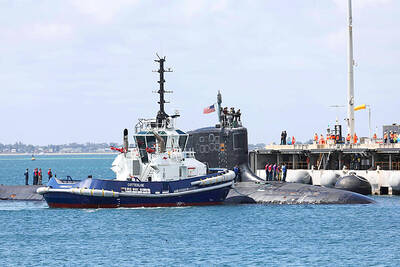South Korean quarantine officials yesterday began slaughtering more than 230,000 poultry after an outbreak of the H5N1 strain of bird flu at a chicken farm, the agriculture ministry said.
A total of 236,000 poultry within a 500m radius of the outbreak site in Iksan, about 250km south of Seoul, will be slaughtered to keep the virus from spreading, ministry official Kim Chang-sup said.
Iksan is a hub of the country's poultry industry. Health officials, backed by police and soldiers, cordoned off a 10km radius around the outbreak site.

PHOTO: AP
"We have increased quarantine activity, maintaining tight restrictions on the movement of people and vehicles there to stop the virus from spreading," spokesman Yoon Yong-do said.
Blood tests on affected birds showed the virus was the H5N1 strain, he said.
"Some 236,000 chickens within a 500 meter radius of the affected farm are being culled and buried," Yoon said, adding that ducks, pigs and dogs were also slaughtered.
He said Minister of Agriculture and Forestry Park Hong-soo chaired an emergency meeting yesterday and called for comprehensive action to tackle the outbreak in the southern city.
"We are closely monitoring the area as there are about 5 million chickens in a 10 kilometer quarantine zone, which also includes Halim," Yoon said.
Halim, the country's top chicken meat processor, supplies 20 to 25 percent of domestic needs and also exports cooked chicken to Japan and other countries.
Japan has already suspended South Korean poultry imports and started requiring people arriving from the country to disinfect their shoes.
"Blood tests on people in the area showed no one has been affected by the virus," Oh Dae-kyu, head of the National Veterinary Research and Quarantine Service, told reporters.
The outbreak occurred last week, resulting in the deaths of 6,700 infected chickens. Another 6,300 were culled.
South Korea killed 5.3 million birds during the last known outbreak of bird flu in 2003.
The H5N1 virus began ravaging Asian poultry stocks in late 2003 and has killed at least 153 people worldwide.
So far, the disease remains hard for people to catch and most human cases have been traced to contact with infected birds. Nine South Koreans were infected by the virus while helping slaughter 5.3 million ducks and chickens from December 2003 to March 2004, but they showed no symptoms of the disease as defined by the WHO.
Also last week, a low-grade strain of bird flu killed 200 chickens in a separate outbreak south of Seoul.
The Agriculture Ministry said it was not the H5N1 strain.
The WHO has warned that it could take years to eliminate the H5N1 virus. Experts say avian flu has entrenched itself in much of Asia and is unlikely to disappear anytime soon.

CSBC Corp, Taiwan (台灣國際造船) yesterday released the first video documenting the submerged sea trials of Taiwan’s indigenous defense submarine prototype, the Hai Kun (海鯤), or Narwhal, showing underwater navigation and the launch of countermeasures. The footage shows the vessel’s first dive, steering and control system tests, and the raising and lowering of the periscope and antenna masts. It offered a rare look at the progress in the submarine’s sea acceptance tests. The Hai Kun carried out its first shallow-water diving trial late last month and has since completed four submerged tests, CSBC said. The newly released video compiles images recorded from Jan. 29 to

DETERRENCE EFFORTS: Washington and partners hope demonstrations of force would convince Beijing that military action against Taiwan would carry high costs The US is considering using HMAS Stirling in Western Australia as a forward base to strengthen its naval posture in a potential conflict with China, particularly over Taiwan, the Wall Street Journal reported on Saturday. As part of its Indo-Pacific strategy, Washington plans to deploy up to four nuclear-powered submarines at Stirling starting in 2027, providing a base near potential hot spots such as Taiwan and the South China Sea. The move also aims to enhance military integration with Pacific allies under the Australia-UK-US trilateral security partnership, the report said. Currently, US submarines operate from Guam, but the island could

RESTRAINTS: Should China’s actions pose any threat to Taiwan’s security, economic or social systems, China would be excluded from major financial institutions, the bill says The US House of Representatives on Monday passed the PROTECT Taiwan Act, which states that Washington would exclude China from participating in major global financial organizations if its actions directly threaten Taiwan’s security. The bill, proposed by Republican Representative Frank Lucas, passed with 395 votes in favor and two against. It stipulates that if China’s actions pose any threat to Taiwan’s security, economic or social systems, the US would, “to the maximum extent practicable,” exclude Beijing from international financial institutions, including the G20, the Bank for International Settlements and the Financial Stability Board. The bill makes it clear that China must be prepared

Taiwanese trade negotiators told Washington that Taipei would not relocate 40 percent of its semiconductor production to the US, and that its most advanced technologies would remain in the nation, Vice Premier Cheng Li-chiun (鄭麗君) said on Sunday. “I told the US side very clearly — that’s impossible,” Cheng, who led the negotiation team, said in an interview that aired on Sunday night on Chinese Television System. Cheng was referring to remarks last month by US Secretary of Commerce Howard Lutnick, in which he said his goal was to bring 40 percent of Taiwan’s chip supply chain to the US Taiwan’s almost